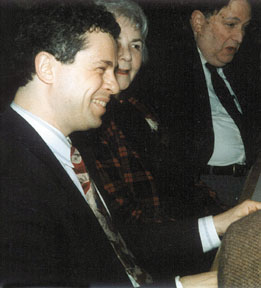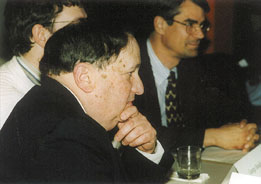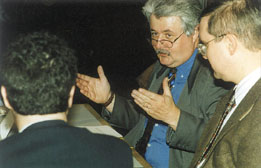| Since 1996 Carnegie Science Centerís "Science
Awards for Excellence" have recognized achievements in fields relating
to science in Southwestern Pennsylvania. In recognition that it takes a
community to achieve these goals, the awards acknowledge inspirational
teaching, as well as partnerships between business, science, and education.
On March 14, 1998, Carnegie Science Center hosted a ceremony to present
the 1998 Science Awards for Excellence, and the award winners are listed
below.
But as a special benefit for Carnegie Magazine readers, the award winners met a few days earlier at Carnegie Science Center for a panel discussion of the ways science and education interact in our region. This rare assembly of talented scientists and educators drew together to analyze a subject very close to them all. The discussion leader was Terry Potter, Technical Director for the Coatings Automotive Business Group of Bayer Corporation. This corporation supports a number of initiatives that promote science literacy. "Making Science Make Sense" is a major corporate effort that includes sponsorship of a daily program on National Public Radio. The BASIC (Bayer Scientists in the Classroom) program organizes hands-on activities, with Bayer employees providing additional resources to local classrooms. In addition, Bayer is a major supporter of the widespread ASSET (Allegheny School Science Education and Technology) program in Allegheny County. Bayer also has been a generous supporter of the Science Center. Terry Potter set the course with a series of questions. Space does not permit including the entire discussion, nor Terry Potterís guiding commentary, as the discussion unfolded. -- R. Jay Gangewere Winners of the 1998 Science Awards for Excellence Elementary Teacher: Joan M. Gorsuch, Burkett Elementary School. Secondary Teacher Award: Sean P. Lally, Sewickley Academy. Post-Secondary Teacher Award: George C. Bandick, Undergraduate Program Coordinator, Chemistry, and Assistant Dean of Arts and Sciences, University of Pittsburgh. Catalyst Award: Jane Konrad, Executive Director, Pittsburgh Regional Center for Science Teachers. Entrepreneur Award: Paul L. Kornblith, M.D., founder of Precision Therapeutics, Incorporated (PTI). Scientist: Dr. T.E. Schlesinger, Professor and Associate Department Head of Electrical and Computer Engineering, Carnegie Mellon University; and Daniel D. Stancil, Professor of Electrical and Computer Engineering and Associate Dean of Academic Affairs, Engineering, Carnegie Mellon University. |

Paul Kornblith: For me there were two different early interests. I always wanted to be a physician, particularly a surgeon, and I also wanted to be a scientist. I grew up in Philadelphia, and Franklin Institute, the cityís science center, was a delightful place full of hands-on activities. I think I went to Franklin Institute every weekend for about five years, and participated in everything they did. After that it was a matter of taking all the various steps: going through college, and medical school, and so on. Today I think Iím lucky to be here in Pittsburgh, during what I am doing with a biomedical company.
George Bandik: I think I was not born to it. I was always very interested in music. For years in high school I refused to take a science class, but in the state of Pennsylvania I had to take biology to graduate. And I just fell in love with biology because of my teacher. Today I think I am a scientist because of the influence of that one woman. Teachers do have a very great influence -- I truly believe that.
Daniel Stancil: When I was young and people asked me what I wanted to be, I always said I wanted to be a physicist. But I didnít exactly turn out to be a physicist. One thing that was especially valuable to me in my junior and senior high school years was having amateur radio as a hobby. That called for lots of commitment to science from me in junior high school.
Joan Gorsuch: My elementary science teacher was just like the energetic Ms. Frizzle, in the Magic School Bus series of books. You never knew what you were going to do next, or what you would find out. She encouraged us, and presented experiences to us, and gave us time to discover things. We must have visited every facility in Pittsburgh. I learned to love science from her. She was the influence on me, and I like to think I can do the same kinds of things for my own children in the classroom now.
Ed Schlesinger: My father is a physicist, his brother is a philosopher
of science, and my mother is a mathematician. Both my parents encouraged
me in science, and I liked science fiction from the start. But my father
never gave me the easy way out if I asked questions. One of my earliest
memories is of being in the car on a trip. It was a long trip, and the
highway was very smooth. I remember asking my dad, "How do you know if
the car is moving?" My dad said that the Earth was still, so we must be
moving. Then I said, "How do you know that the Earth isnít moving, and
that we are arenít standing still?" And my dad said, "We donít." It was
typical of the way he answered all my questions. That had a lot to do with
making me want to figure things out as I grew up.
 Are we doing a good
job in science education today?
Are we doing a good
job in science education today?David Zazac (Public Information Assistant for the Allegheny County Health Department, and a Co-Chairperson of the Catalyst Award): I find at the Allegheny Department of Health that students call us about everything. They call us with specific requests such as "Can you give me the concentration of ozone at ground level?" Teenagers call us with questions about public health issues such as AIDS and sexually transmitted diseases. People call us with questions about the air they breathe and the water they drink. Itís exciting for us.
Sean Lally: When it comes to teaching science, I have learned a lot about physics, and teaching, from veteran teachers of physics. Ever since I left college Iíve been involved with the High School Physics Teachers Association, and Iíve been president of this organization for eight years. Every school has its support groups for physics, chemistry, and biology. I would like to see even more teachers and students at our associationís meetings. We have some 250 science teachers in our general southwestern Pennsylvania area. Our meetings are a lot of fun and very helpful. We offer a lot of events for students, such as Physics Amusement Park Day.
Joan Gorusch: When children come to my classes in third grade, I see their natural curiosity. I see many parents supporting their children in a positive way, and I disagree with the complaint that parents today are not supporting their childrenís education at school they way they used to.
But some kids lose their curiosity about science along the way. Itís too bad. Because science is around them 24 hours a day. Itís there in the microwave in the kitchen and in their backyard. Itís the elementary teacherís responsibility to capture their natural curiosity and to build on it.
I think one reason science education begins to fall behind is that elementary teachers are often afraid of science. When you look at undergraduate science courses in college you see that often they do not include hands-on experiments. You read a text -- but you cannot learn science properly by reading alone. A teacherís last class in chemistry might have been in high school, at a time when they were not as involved with science as children today. Thatís part of the problem.
But there are a lot of programs today that can bring science into the classroom, with very delightful results. Thatís why we have developed the inquiry-based science curriculum known as ASSET, which is now used in 26 schools and 914 classrooms in Allegheny County.
George Bandik: About three years ago, at Pitt, we wiped out the undergraduate degree in education as it used to be. Today you have to get a four-year degree in a major and then get certified. We lost a lot of students when we went to that program change. In chemistry, for example, the teachers we are producing take the same chemistry courses as our pre-med students, as our chemistry majors, and as our graduate students. I think they are ready. But I know you can go to other colleges in our area and still get that education degree in four years.
Joan Gorsuch: The majority of teachers working in the classrooms right
now need more support. When new science programs are introduced into the
school systems, professional development for the teachers should be part
of the program. They need to have an update on the scientific content --
things are moving so quickly.

Terry Potter: I think it is interesting that most of the publicity about technology seems to be about computers and software. People donít realize that so much of the research being supported today is in other areas -- like the work at Applied Electro-Optics Corporation, or at Precision Therapeutics, Inc., where Dr. Kornblith is advancing research in the study of brain cancer.
Ed Schlesinger: You see the economic impact of research in the stock
market reports. People say the "technology sector" went up, not that specific
automobile stocks went up. Scientists feel that everyone does well when
technology itself drives the Dow up -- itís a period of tremendous growth.
Joan Gorsuch: Children have to see the science at work in their lives. How many children look at their pediatrician as a scientist? What about the nurse who weighs them or takes their temperture? Science needs to become more of a living force in everyoneís life. We need to see real people sharing their knowledge with children, and not regard knowledge as simply the responsibility of the school teacher. Businesses can be more helpful here.
George Bandik: I think that is the weak link. Two years ago when we
were doing a quality control study for our science program I called several
industries in the Pittsburgh area and asked if they could send someone
to come and talk to me. They said they didnít have the time. "You
teach them, and we will hire them" was one response I got. The teachers
in Pittsburgh need stronger ties to the business community, a better way
of getting feedback from the workplace.
Imagine a person who invests a huge amount of money in the lottery. Does this person have any knowledge about the statistical probabilities of winning? I remember I had a professor who once said to a student, "You doníít know the difference between a proton and a crouton."
Ed Schlesinger: I think that a certain type of scientific information is simple. Suppose we were to discover that there is mercury in the Monongahela River. We can test for that. But then you ask, does this matter? Some people might say it has "always" been there, and so it is natural for it to be there. But others might say it has always been bad environmentally, as a chemical element in the river. So how much money, if any, should we spend to clean it up? These are the sorts of decisions people have to make, but they cannot make an informed decision based on simple scientific data, without understanding what the data mean.
Daniel Stancil: I would add that there is another element to scientific literacy. There is an element of passion to crack open a problem and find the answer. We all talked about this when we discussed why we got interested in science. There are sound reasons why you should learn about science, but that is not what motivated most of us as young people to go into science.
Special thanks to the students from the Court Reporting Program at the
Community College of Allegheny County for providing a transcript of the
round table discussion.
Student Award Winners and Presenting Sponsors of the 1998 Science Awards for ExcellenceStacy Ivol, Junior Division. Stacey is an eighth grade student at Independence Middle School and won the award for her life sciences project. Jennifer S. Yip, Senior Division. Jennifer is a senior at Fox Chapel Area High School and won for her project in biology. Presenting Sponsors: Adtranz, Alcoa Foundation, Aristech Chemical Corporation, Bayer Corporation, Ben Franklin Technology Center of Western Pennsylvania, Cutler-Hammer, Duquesne Light, Fisher Scientific, Highmark Blue Cross Blue Shield, Kennametal, Inc., PPG Industries, Inc., Sony Technology Center-Pittsburgh, UPMC Health System, Union Switch & Signal Inc., Westinghouse Foundation. |
Contents |
Highlights |
Calendar |
Back Issues |
Museums |